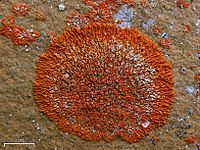
Photo from wikipedia
Photosynthetic algae are the main primary producers in polar regions, form the basis of polar food webs, and are responsible for a significant portion of global carbon fixation. Many cold-water… Click to show full abstract
Photosynthetic algae are the main primary producers in polar regions, form the basis of polar food webs, and are responsible for a significant portion of global carbon fixation. Many cold-water algae are psychrophiles that thrive in the cold but cannot grow at moderate temperatures (≥20°C). Polar regions are at risk of rapid warming caused by climate change, and the sensitivity of psychrophilic algae to rising temperatures makes them, and the ecosystems they inhabit, particularly vulnerable. Recent research on the Antarctic psychrophile Chlamydomonas priscuii, an emerging algal model, has revealed unique adaptations to life in the permanent cold. Additionally, genome sequencing of C. priscuii and its relative Chlamydomonas sp. ICE-L has given rise to a plethora of computational tools that can help elucidate the genetic basis of psychrophily. This minireview summarizes new advances in characterizing the heat stress responses in psychrophilic algae and examines their extraordinary sensitivity to temperature increases. Further research in this field will help determine the impact of climate change on psychrophiles from threatened polar environments.
Journal Title: Physiologia plantarum
Year Published: 2022
Link to full text (if available)
Share on Social Media: Sign Up to like & get
recommendations!